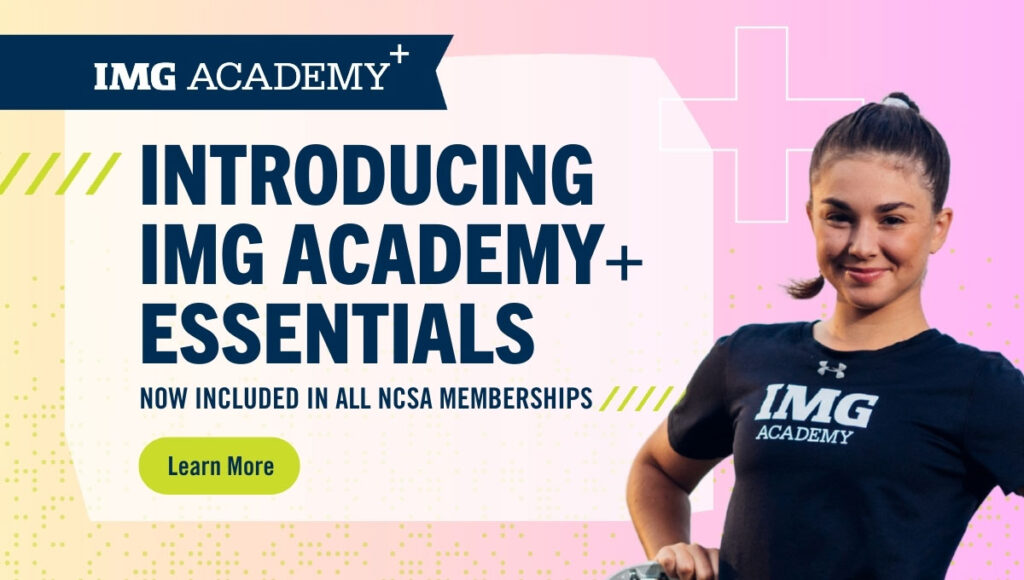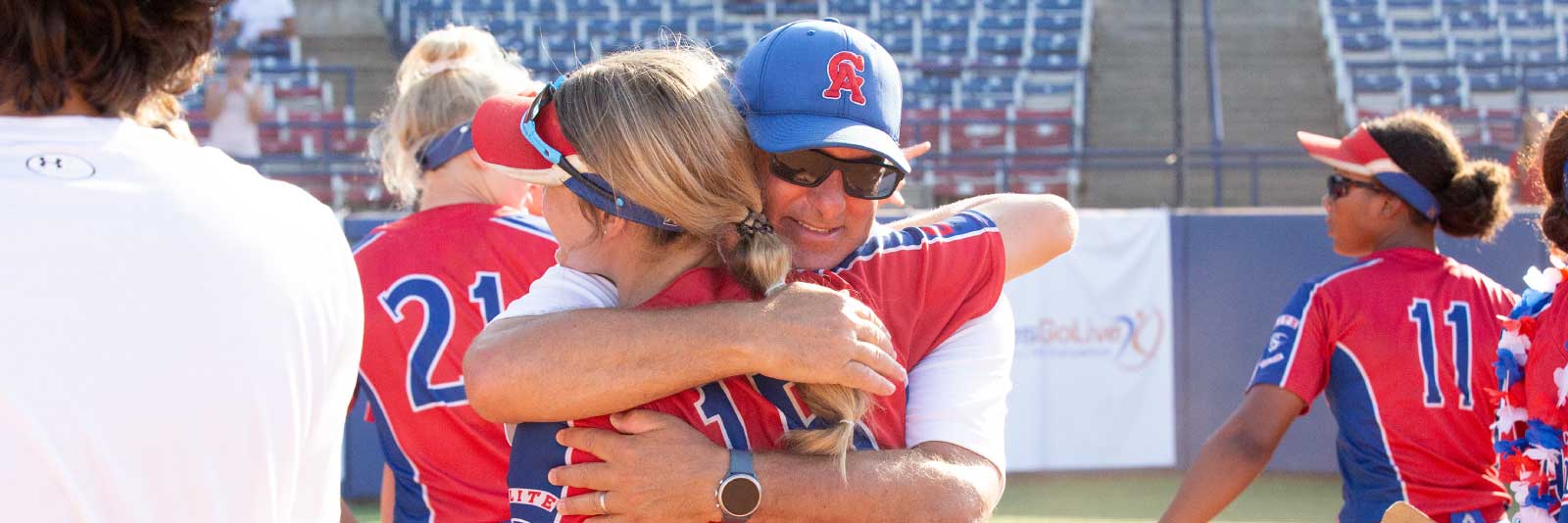The softball recruiting process is competitive, leaving many families unsure how to get recruited for college softball. With only 8% of high school players making it to college teams, it’s no surprise that many families aren’t sure where to start. But here’s the good news—it is possible. The athletes who succeed are the ones with the right mix of talent, academics, drive, and a smart recruiting strategy.
That’s where we come in. We’ve put together a softball recruiting guide to help you every step of the way. It’s full of key milestones, practical tips, and advice to help you stand out.
Quick Links
How the college softball recruiting process works
The softball recruiting process can seem complex, but understanding it from a coach’s perspective can help athletes understand what to expect. Coaches aren’t just looking for skilled players—they’re searching for the right fit for their program’s culture, needs, and competitive goals. Here’s a breakdown of how coaches identify, evaluate, and recruit top talent for their teams.
- Talent identification: Coaches scout players through tournaments, showcases, camps, online profiles, and highlight videos. They prioritize athletes with strong skills, stats, and potential.
- Contacting prospects: NCAA recruiting rules dictate when and how coaches can contact players, often starting with emails, questionnaires, or camp invites.
- Evaluations: Coaches assess athletes in person and/or through film to determine their fit for the team. When evaluating an athlete, coaches will also take note of their character, attitude, and academics.
- Building relationships: Coaches maintain communication throughout the process to gauge interest and educate prospects about their program.
- Making offers: Coaches extend verbal offers to athletes that best fit their team needs and culture fit, and scholarships available.
How to get recruited for college softball
The college softball recruiting process is competitive, but with the right approach, you can stand out and catch the attention of coaches. Below we break down the essential steps to help you navigate the process and achieve your goal of playing at the next level.
- Build a strong online presence: Create a high-quality video showcasing key abilities like hitting, fielding, pitching, or catching, and pair it with a detailed online recruiting profile that includes stats, highlights, academic information, and contact details for coaches to easily access. Make sure you continuously update your profile with any new stats or videos.
- Attend camps and showcases: Participate in events where college coaches are scouting to showcase your talent and gain exposure. This will take some research to find out what recruiting events coaches at your target schools are attending.
- Be proactive in communication: Email coaches with personalized messages that include your video, profile, and why you’re interested in their program. Be diligent with your communication-never leave a coach on “read”!
- Focus on academics: Strong grades and test scores make you more recruitable and eligible for scholarships. Keep your grades up and make sure you are meeting the NCAA Eligibility requirements.
- Attend official and unofficial visits: College visits allow you to evaluate programs and make a lasting impression on coaches. Prepare questions ahead of time and treat every interaction, whether it’s with the coaching staff, current team or admissions counselors as part of your recruitment.
- Negotiate offers: Once you receive an offer, assess and negotiate. Don’t hesitate to ask questions or discuss your needs. Coaches respect recruits who advocate for themselves in the negotiation process.
Get more tips for managing your recruiting process.
What do coaches look for in a softball recruit?
College softball coaches evaluate athletes on a combination of skill, character, and potential. Here’s what they prioritize:
- Technical skills: Strong hitting, fielding, pitching, or catching abilities that align with their program’s needs.
- Athleticism: Speed, agility, strength, and overall athletic potential.
- Game IQ: The ability to make smart decisions on the field and demonstrate a deep understanding of the game.
- Coachability: A positive attitude, willingness to learn, and ability to adapt to feedback.
- Consistency: Reliable performance under pressure and against tough competition.
Explore softball recruiting standards by position and division.
When does recruiting start for softball?
The NCAA prohibits all types of communication and contact between D1 softball coaches and prospective recruits before September 1 of an athlete’s junior year.
Getting recruited to play college softball is competitive, and understanding the recruiting timeline is key to boosting your chances of success. College coaches evaluate athletes long before they can officially reach out on September 1, making it crucial for players to be proactive and prepared early.
Getting started: Level set your talent and expectations
The softball recruiting process starts with you, your family and your current coach. One of the first things you should do is sit down with your parents and go through the following questions, answering as honestly as possibly:
Am I ready for the demands of being a college softball player? No matter what division level you compete at, softball is going to take up a lot of your time. There will be early practices, training sessions, games and traveling on top of your classes and homework. Make sure you’re ready for this level of commitment before you dive into the recruiting process.
Am I good enough to play college softball? Answering this question requires you to critically analyze your current skillset and athleticism, as well as project how much you’ll be able to improve by the time you’re a freshman in college. You can get evaluated by a third party like NCSA. Our staff has former college softball coaches and athletes who know exactly what it takes to compete at the college level and can give you key softball recruiting tips to help you find your best college match-start here!
What division level(s) am I qualified to play at? Ask your current coach, a qualified third-party like NCSA, or college coaches themselves what division levels you might be qualified to compete at. Learn more about the different division levels.
Signing with your top school
To formalize a scholarship offer and make it legally binding, you need to sign with the school. NCAA D1 and D2 programs as use a financial aid agreement, while NAIA and NHCAA schools have their own version of this agreement. By signing this document, you’re agreeing to compete at the school for one year, and the school is promising to provide you with the agreed upon scholarship for that one year. Learn more about the NCAA financial aid agreement.
And your recruiting journey is over! Don’t forget to celebrate this important moment as you look ahead to the next chapter of your life.
Check out this video featuring NCSA athletes who have committed to playing at the college level—you could be next!
FAQs
What is the best way to research schools and create a target list?
Explore our full list of softball colleges. Cast a wide net when looking at schools! Always include a mix of division levels in your target list. You might be surprised which division level is right for you, and it maximizes your opportunity to get a college softball scholarship. Check out this list of questions to ask yourself to help you find your best college match.
How do I create an eye-catching skills video?
Your skills video should show off your hitting, speed, primary position, secondary position and what makes you unique as a softball player. Get more tips on how to make a softball skills video.
How can I proactively reach out to the coaches on my target list?
Once you have the contact information for the coaches on your list, you can start your outreach. For a step-by-step guide for communicating with college softball coaches, visit the Contacting College Coaches page in our college recruiting guide.
What softball events will get me in front of college coaches?
First you will want to explore softball camps, showcases and tournaments to attend. Before you attend these events, research which events will have college in attendance and if the camp historically has high coach attendance. Next, contact those coaches to confirm that they will be there and let them know to keep an eye out for you. Read more about softball camps, combines and showcases and how to find the right ones to attend.
How do I find and negotiate scholarship offers?
Learn how many scholarships are available by division and proven strategies to stand out and secure offers here. Check out this guide to learn how to navigate offers, request more funding, and make the best decision for your future.
Get Started with NCSA Today!
Our team of former student-athletes knows exactly what it takes to navigate the recruiting journey—they’ve been in your shoes. From tackling the nerves of reaching out to coaches to building a standout profile, we’re here to guide you every step of the way. Take control of your future and create a free profile today!

